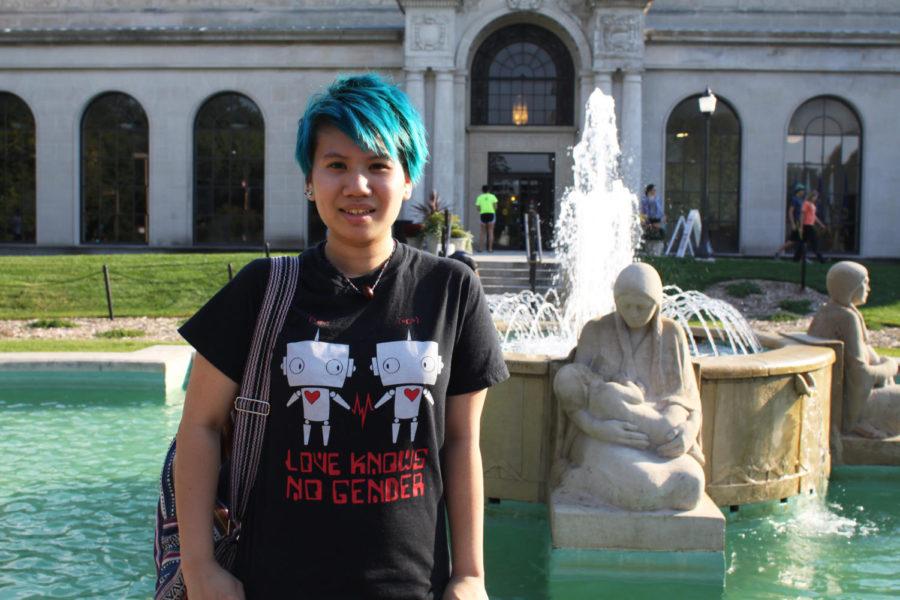Comfort in coming out: International LGBT student finds acceptance through ISU peers
September 29, 2014
Emery Thanathiti couldn’t sit still any longer.
After listening to students say gay students should have to tell their roommate about their sexual orientation, Thanathiti stood up in anger.
Thanathiti, senior in English, attended the Strange Like Me plays at Destination: Iowa State this year. One of the plays showed a student finding out his roommate is gay.
Thanathiti, standing in protest, announced to the full Great Hall that she was bisexual and that just because she wasn’t straight didn’t mean she had to introduce her sexuality when she met people.
When she sat down, legs shaking, she received hugs and high fives from some of the crowd members sitting around her.
“I just felt like it’s really awesome that there were people out there who actually accepted me for who I am,” Thanathiti said.
It was the first time she had come out to anyone and it ended up being a crowd of more than 100 people.
Coming from Thailand and having dual citizenship in Hong Kong, Thanathiti said it is hard to have a conversation about sexuality at home with her family and friends. She chooses pants and loose T-shirts over skirts or blouses the majority of the time. When she arrived at Iowa State, she sported brightly dyed hair and had her gender listed as male on her Facebook page.
She said her family tries to ignore that she doesn’t conform to traditional gender roles and thinks it is a phase that she will outgrow. Thanathiti came out to her father when she went home to Thailand during summer 2013 and they haven’t had a conversation about it since.
When she dresses and acts like a boy back home she has been told she shouldn’t act like a boy unless she wants to have a sex-change operation. In America, Thanathiti said she feels safe to be herself. She can have open conversations about sexuality and gender norms and not be prodded by unwanted questions.
“I’ve come across some bad people, but they’re not that bad about it at all. They may not understand completely per se, but they try their best, and they let you do what you want,” Thanahiti said. “They may tease you occasionally, but they don’t mean to hurt you.”
Brad Freihoefer, coordinator of Lesbian, Gay, Bisexual and Transgender Student Services, said his office works with the International Students and Scholars office to help provide students with resources that can help them work through any problems they have when dealing with their identity as an international student or as someone who identifies on the LGBT spectrum.
Freihoefer has given a presentation on the resources that LGBTSS offers to the Indian Students Association for the past three years.
“You’re coming from a country where you don’t talk a lot about LGBTQA issues,” Freihoefer said. “This is [going to] seem like something really different coming to Ames, Iowa, in the middle of the country, in a state that has laws that are pretty inclusive when it comes to LGBT identity.”
Thanathiti said she felt great when she was sometimes mistaken as a boy when she lived in Hong Kong. She said not being associated with feminine terms was the best feeling in the world.
Even though she could be mistaken for a boy and avoid being held to female gender stereotypes, Thanathiti said she was unable to talk to anyone about how she felt without them thinking it was just a phase.
She said “it sucks” that she isn’t mistaken for a boy in the United States but would rather have the freedom she’s found at Iowa State to talk about her sexuality and gender preference.
“When I was back home, when I say I’m confused, people constantly prod and push and be like, ‘So do you like girls, do you like guys, do you want to be a guy?’ When I’m here it’s like, ‘I’m confused, I’m still figuring it out,’ and they’re like, ‘Okay,’ and they just drop the subject,” Thanathiti said.
According to the Human Rights Campaign, there are 78 countries where being lesbian, gay, bisexual or transgender is criminalized. In 10 of those countries, those who identify as part of LGBTQA could be punished by death.
“It can be a very scary process for international students who may identify as LGBTQA, or however they identify, as potentially non-straight or non-gender conforming,” Freihoefer said.
He said the LGBTSS helps students wherever they are personally in their lives, even if they are not comfortable coming out.
“We’re here to support them. We’re here to assist and get them connected with resources to be successful,” Freihoefer said.
As Thanathiti was trying to figure out who she was, she said she wanted to be able to identify herself in a category. She felt she needed to belong to a term and moving to school in America allowed her to claim bisexuality.
She said identifying as bisexual allowed her to move past needing to fit into a category and identify just as queer, which she described as an umbrella term.
“A lot of people were just like, ‘It really doesn’t matter who you are — you’re just an Emery,’” Thanathiti said.
She said it was liberating to see herself as an individual among other people.
Thanathiti said she doesn’t like gender norms and said people can call her by he, she or whatever pronoun they want, and she doesn’t care.
“Honestly,” Thanathiti said. “I’m just waiting for the day that everyone will just be human beings.”







